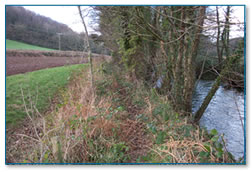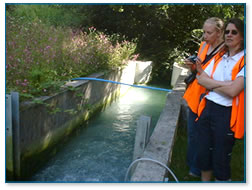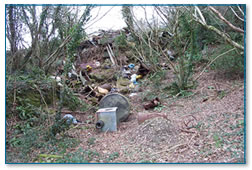river
and waste issues
|
|
Stock erosion |
Fenced river bank |
It is possible to prevent pollution
continually entering our rivers and killing fish and other wildlife.
In most cases pollution is not intentional and is often caused by
thoughtlessness. To some people preventing pollution is an unwelcome
added cost. However, in the long term, looking after the countryside
and preventing pollution is cost effective and protects our environment
for future generations.
|
|
Erosion before fencing |
Same view after fencing |
|
|
Ditch fenced off |
Wide buffer zone |
Fencing riverbanks is one way
to prevent sheep and cattle eroding the banks and polluting the
water. However, the farmer would have to provide alternative drinking
sources as well as the fencing, which can be expensive. On the other
hand, the farmer does not lose the soil his livelihood depends on
and his animals have less illness and injury, which saves him money
in vets bills, etc.
 |
Buffer strip by
river |
Arable farmers can be encouraged
to leave a broad strip at the edge of fields that is not sprayed
with fertilisers or pesticides. In this way, riverbanks and hedgerows
are protected. However, the farmer loses arable land in the process
and can have a reduced crop.
Buffer strips can be a preventive
measure for other activities. If a wildlife strip separates the
farming activities or industrial works from the river it can provide
not only a safety barrier but also a way of filtering and cleaning
dirty water and preventing eroded soil and chemicals from being
washed into the river.
 |
Quarry water channel |
Industries can be persuaded to install safety measures to prevent
oil or chemical spills. Quarrying companies can ensure that excess
water is channelled into catch pits and lagoons away from the works
and not directly into the river. Although digging out sediment from
catch pits is expensive, it reduces the risk of sediment polluting
rivers and the cost of putting things right if an accident occurs.
 |
Rubbish tip |
There are some illegal activities, such as fly tipping, which are
difficult to prevent and too expensive to police. Some thoughtless
people will take their rubbish in a car or truck and tip it into
a convenient roadside wood, stream or lay-by. Some rubbish is merely
unsightly (old beds or tyres) but other stuff tipped can be toxic
(poisonous) and dangerous to wildlife, such as old paint cans, pesticide
containers, leaking batteries or used sump oil. Often it would be
quicker, easier and cheaper for these people to travel to the nearest
recycling centre, and we would not have to pay so much in taxes
for the Council to clear up the mess.
Read and discuss the Case Studies on Quarrying
(W02a), Farming (W02b)
and Industry (W02c)
|

